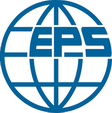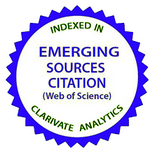Colloidal synthesis and optical properties of ultra-small CdTe quantum dots
DOI:
https://doi.org/10.15330/pcss.25.4.838-843Keywords:
synthesis technology, ultrasmall quantum dots, centrifugation, absorption spectra, photoluminescence, photoluminescence excitation spectraAbstract
The colloidal synthesis of CdTe nanocrystals (NCs) in a reactor whose reaction medium consists of a solution of CdI2 salt, thioglycolic acid (TGA), and NaOH alkali. The gaseous precursor H2Te, which was obtained electrochemically in a galvanostatic cell, was passed through this solution. The size of the synthesized NCs was varied by egulating the flow of hydrogen telluride from galvanostatic cell. In turn, the outflow of hydrogen telluride depends on the current that passes through the cell electrodes. The growth rate of nanocrystals is determined by the rate of precursor feeding into the reactor. Studies have shown that this synthesis usually produces CdTe NCs of different sizes. To separate the colloidal solution into fractions, a centrifugation method was proposed, which allowed to isolate ultra-small quantum dots (USQDs) of CdTe with dimensions of about 2 nm. To obtain QDs of ultra-small size, we used low current values (up to 100 mA), a short synthesis time (0.5-1 min), and high pH values (8-11) of the reaction medium. The study of the absorption spectra of CdTe NC samples taken from the fraction with the smallest size separated by centrifugation showed that the energy of the corresponding transitions significantly exceeds the band gap of bulk CdTe (1.5 eV), and which correspond to CdTe USQDs (clusters). Our study of the size of CdTe on the Zetasizer Nano ZS confirmed the presence of USQDs with dimensions of approximately 2 nm. It has been shown that the photoluminescence of the USQDs is mainly due to surface defects.
References
D.V. Korbutyak, O.H. Kosynov, B.N. Kulchytskyi, Ultrasmall quantum dots: features of synthesis, optical properties and prospects for practical use (review), Optoelectron. Semicond. Tech., 58, 21 (2023); https://doi.org/10.15407/iopt.2023.58.021.
I.M. Kupchak, D.V. Korbutyak, Spectral characteristics of passivated CdTequantum dots with coordinate-dependent parameters, Ukr. J. Phys., 68, 38 (2023); https://doi.org/10.15407/ujpe68.1.38.
A.E. Raevskaya, O.L. Stroyuk, D.I. Solonenko, V.M. Dzhagan, D. Lehmann, S.Y. Kuchmiy, V.F. Plyusnin, D.R.T. Zahn, Synthesis and luminescent properties of ultrasmall colloidal CdS nanoparticles stabilized by Cd(II) complexes with ammonia and mercaptoacetate, J. Nanopart. Res., 16, 2650 (2014); https://doi.org/10.1007/s11051-014-2650-5.
M. Valakh, V. Dzhagan, A. Raevskaya, S. Kuchmiy, Optical investigations of ultra-small colloidal nanoparticles and heteronanoparticles based on II–VI semiconductors, Ukr. J. Phys., 56(10), 1080 (2011); https://doi.org/10.15407/ujpe56.10.1080.
A.Ch.A. Silva, S.W.da Silva, P.C. Morais, V.O. Dontas, Shell thickness modulation in ultrasmall CdSe/CdS(x)Se(1-x)/CdS core/shell quantum dots via 1 – thioglycerol., ACS Nano, 2014.8 P.1913 (22). doi:10.1021/nn406478f.
S.V. Kershaw, Burt M., M. Harrison, A. Rogach, H. Weller, Eychmüller A., Colloidal CdTe/HgTe quantum dots with high photoluminescence quantum efficiency at room temperature, Appl. Phys. Lett., 75, 1694 (1999); https://doi.org/10.1063/1.124792.
S.F. Wuister, F. van Driel, A. Meijerink, Luminescence and growth of CdTe quantum dots and clusters, Phys. Chem. Chem. Phys., 5, 1253 (2003); https://doi.org/10.1039/b211953f.
M. Mullenborn, R.F. Jarvis, B.G. Yacobi, R.B. Kaner, C.C. Coleman, N.M. Haegel, Characterization of solution-synthesized CdTe and HgTe, Appl. Phys. A, 56, 317 (1993).
R.J. Bandaranayake, G.W. Wen, Lin J.Y., H.X. Jiang, C.M. Sorensen, Structural phase behavior in II-VI semiconductor nanoparticles, Appl. Phys. Lett., 67, 831 (1995); https://doi.org/10.1063/1.115458.
J. Pérez-Conde, A.K. Bhattacharjee, M. Chamarro, P. Lavallard, V.D. Petrikov, A.A. Lipovskii, Photoluminescence Stokes shift and exciton fine structure in CdTe Nanocrystals, Phys. Rev. B, 64, 3303-1 (2001); https://doi.org/10.1103/physrevb.64.113303.
M.T. Wilson, C.Y. Li, J.D. MacKenzie, N.M. Haegel, Photoluminescence excitation study of CdS Nanocrystals in ormosils, Nanostructured materials, 2, 391 (1993); https://doi.org/10.1016/0965-9773(93)90181-A.
Y. Rakovich, L. Walsh, L. Bradleya, J.F. Donegana, D. Talapinb, A. Rogachb, A.Eychmüller. Size selective photoluminescence excitation spectroscopy in CdTe quantum dots, Proc. of SPIE, 4876, 432 (2003); https://doi.org/10.1117/12.463693.
O.A. Kapush, L.I. Trishchuk, V.N. Tomashik, Z.F. Tomashik, S.D. Boruk, O.V. Zynyuk, Preparation of concentrated monodisperse colloidal solutions of CdTe nanocrystals, Russ. J. Inorg. Chem., 60, 1258 (2015); https://doi.org/10.1134/S0036023615100083.
O.A. Kapush, L.I. Trishchuk, V.N. Tomashik, Z.F. Tomashik, S.I. Budzulyak, S.D. Boruk, V.N. Ermakov, L.A. Demchina, Effect of medium pH on the optical properties of CdTe nanocrystals at colloidal synthesis and postsynthetic treatment, Russ. J. Inorg. Chem., 61, 581 (2016); https://doi.org/10.1134/S0036023616050089.
Downloads
Published
How to Cite
Issue
Section
License
Copyright (c) 2024 K.S. Dremliuzhenko, B.N. Kulchytskyi, D.V. Korbutyak, O.G. Kosinov, O.F. Isaieva, N.V. Mazur, L.I. Trishchuk

This work is licensed under a Creative Commons Attribution 3.0 Unported License.









